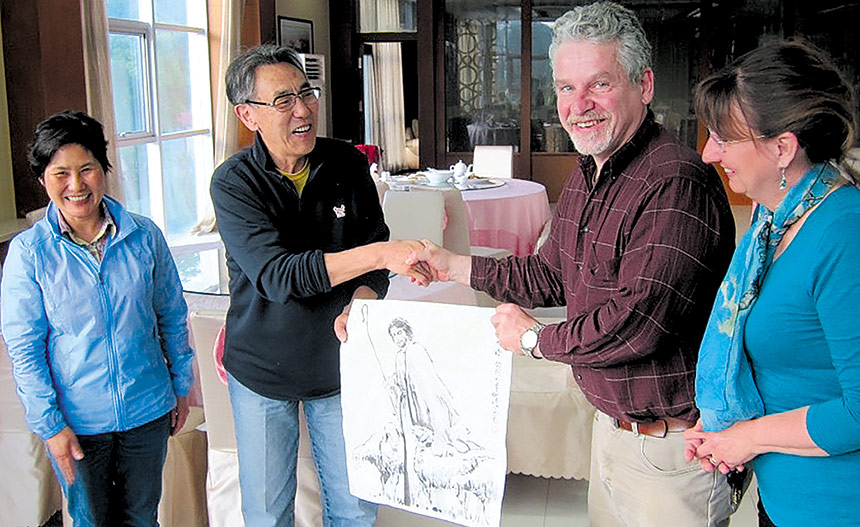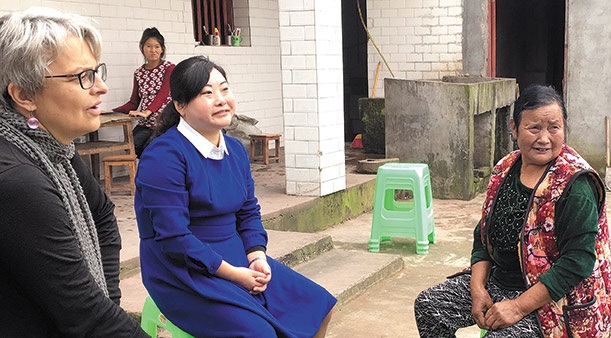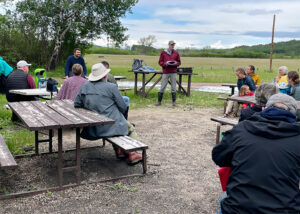What does mission look like in a country where the church is well established? From Jeanette Hanson’s point of view it’s a web of interconnected relationships.
Hanson is a Mennonite Church Canada Witness worker and the associate director for Mennonite Partners in China (MPC). For 10 years, Hanson and her husband Todd taught English under MPC’s former iteration, China Educational Exchange. Since 2001, she has worked full-time at building the MPC web, connecting Chinese Christians with each other and with North American Mennonites.
MPC is a partnership of MC Canada, Mennonite Mission Network, Eastern Mennonite Missions and Mennonite Central Committee (MCC). Its main office is in Harrisonburg, Va., where Myrrl Byler serves as director.
In addition to Byler and Hanson, MPC employs two full-time workers in China. Yin Hongtao, a graduate of Anabaptist Mennonite Biblical Seminary, works to connect Chinese church leaders with each other but also with North American Mennonites. Betty Zhang is MPC’s official business presence in China. She deals with taxes and irons out the logistics of international exchanges, such as visas.
MPC facilitates a variety of international exchanges. Chinese young adults participate in MCC’s International Volunteer Exchange Program (IVEP). An ongoing pastor exchange program has seen Canadian Mennonite pastors visit China and Chinese pastors reciprocate. North American health professionals have visited China to share expertise on elder care, and Chinese health professionals have travelled to North America through Mennonite Health Services for four-to-six-week internships. A young Chinese pastor, currently studying at Eastern Mennonite Seminary in Harrisonburg, serves in youth and campus ministry with local Mennonite churches.
Chinese church leaders are also open to exchanges going the other way. “Chinese Christians would like to take our young people as interns in their churches,” says Hanson.
She admits that the language barrier is daunting, but surmounting it is absolutely essential in building relationships. MPC once had close to 40 people teaching English in China; now there are only four. But just teaching English isn’t enough. “We need the people who go there to . . . be placed strategically where they could teach English and use other skills” to help build the web, she says.
Since 2015, Hanson and her family have been based in Canada. Although partly for family reasons, their move also suited the Chinese church’s needs. “They want me here to maintain the web on this side,” she says.
Hanson visits China twice yearly. On her most recent trip she met with IVEP alumni, supporting them and connecting them with one another. She visited with teachers in special education and early childhood education facilities, in order to find suitable exchange placements for students from Bluffton (Ohio) University. She also met with Rebecca Burkholder and Blaine Derstine, MCC’s new directors for Central Southern and Northeast Asia, to talk with them about the work MCC does in China through MPC.
While in China, Hanson asked several church leaders to reflect on the relationship between Mennonites and the Chinese church. Her colleague Yin Hongtao suggests the ideal partnership is one “where our work together benefits us both, where we grow together and learn from each other.”
Yin goes on to say, “Anabaptist thinking is a good fit for China in the present, but we lack resources. You can rediscover your Anabaptist faith and the strength of that teaching as you work to share this with our churches here. We can work together in translating and developing study materials.”
Pastor Peter (a pseudonym) trains young pastors at a Chinese Bible college. He says, “You are called Christendom, but your voice is small. Chinese Christians have more passion to preach to all levels of society, but you have not even passed your faith to your young people. The attraction of secularization is great. We see it too here, more and more. We can learn from each other.”
Pastor Timothy (also a pseudonym) pastors a “conference” of about 80 congregations with a total of 250,000 members. “When I hear that churches in North America are smaller than ever and people are mourning that ‘the church is dying,’ I don’t believe it,” he says. “The church is more than how many people are in the pews on a Sunday morning. When I saw your schools and social service projects, nursing homes and quality medical programs, I saw the essence of Jesus’ call to be salt and light to a world in need.”
When Chinese church leaders look to the future, they think long-term, says Hanson. And they see themselves as having something to offer Mennonites in North America. She says they have told her that “the next 20 years will be a time where we step up and support you, so that you do not turn into yourselves and become insular.”
The challenge for Mennonites, says Hanson, will be to be open and accept what the Chinese church has to offer.









Leave a Reply
You must be logged in to post a comment.